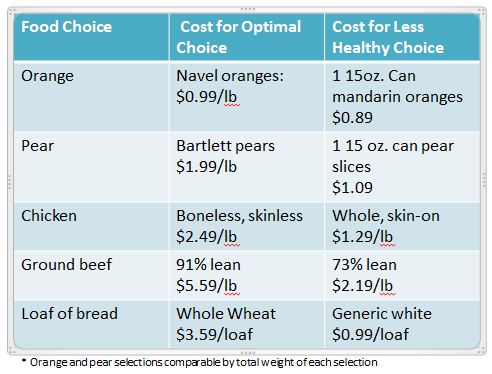June 09, 2011
Maternal Obesity from All Sides (Part Four)
By: Joanne I Leigh-Murfin, RN, LCCE | 0 Comments
[Editor's note: In this guest post by UNC-Charlotte Assistant Professor of Nursing, Kristen Montgomery, PhD, RN, we will contemplate some of the sociocultural and financial issues that complicate maternal weight issues. The table you will find in this post, offers a representation of the differences in food costs--between "optimal" and "less healthy" food choices. Access to healthy food is one small cog in the larger wheel of body weight and overall well-being.]
Maternal Obesity- How Can Childbirth Educators and Maternity Care Providers Best Counsel  Pregnant Women? Most of us are aware that overweight and obesity levels have reached epidemic proportions in most areas of the United States. Many of us are also aware of the risks to women's health in the context of overweight and obesity. In addition to women's health risk, emerging evidence exists that demonstrates there are long-term risks for the infant born to an overweight mother and risks to the family as well. These risks were generally discussed in the first three posts in this series, and will be further evaluated in subsequent segments of this series.Women tend to be the "health maintainers" for the familythey schedule health care appointments, cook the family meals, and shop for food. In this role, women often inadvertently control what other family members have access to in terms of food and meals. In addition, women also play a role in setting the culture of the family. If mom exercises, it is more likely the children and/or family will exercise too. So how does this tie into maternal obesity and how childbirth educators and maternity providers can help women with weight issues?
Pregnant Women? Most of us are aware that overweight and obesity levels have reached epidemic proportions in most areas of the United States. Many of us are also aware of the risks to women's health in the context of overweight and obesity. In addition to women's health risk, emerging evidence exists that demonstrates there are long-term risks for the infant born to an overweight mother and risks to the family as well. These risks were generally discussed in the first three posts in this series, and will be further evaluated in subsequent segments of this series.Women tend to be the "health maintainers" for the familythey schedule health care appointments, cook the family meals, and shop for food. In this role, women often inadvertently control what other family members have access to in terms of food and meals. In addition, women also play a role in setting the culture of the family. If mom exercises, it is more likely the children and/or family will exercise too. So how does this tie into maternal obesity and how childbirth educators and maternity providers can help women with weight issues?
First, when working with individuals and behavioral change interventions, it is helpful to specifically tailor interventions to the individual's life circumstances, cultural beliefs, and experiences. Generally, knowledge alone is not enough to get an individual to change behavior or act. So, simply telling women that they are overweight and/or obese and that they need to lose weight to prevent complications such as type 2 diabetes, heart disease, etc. will often be ineffective. For pregnant women, there is often more motivation to act in the baby's best interest, even if women have not previously put their own health first. However, even with the baby's health as motivation, pregnant women may need assistance to develop a plan to make the health care providers' recommendations a reality. Education about the maternal and infant risks is an important first step; however, childbirth educators and maternity providers must go a step further and help the individual woman realize how she can integrate recommendations into her current lifestyle and resources.
For example, if you advise a woman that she needs to increase her dietary intake of fruits and vegetables, it is also advisable to work with her to figure out how she can accomplish this goal, given her current lifestyle, culture, and resources (monetary and other resources). If one can provide a woman with assistance to figure out how she can be successful in implementing health care recommendations, it goes a step further to ensure her success. If she tells you she cannot afford more vegetables on her income, referrals can be made to community resources that provide food assistance, for example. Many women cannot take these next steps on their own or do not know how to access the systems in place to help them. By taking a few extra moments to help women develop a plan for success, you're contributing to improving maternal, infant, and family health!

For women who are overweight or obese, it is important to convey the message that even small improvements in weight and physical activity/fitness can make a difference. Obese women do not need to lose all of their extra weight or start running marathons to see health improvements. Small amounts of weight loss contribute to improved health. Baby steps go a long way in getting women started to a healthier future.In addition, women who are overweight or obese may have psychosocial symptoms. Research has supported a link between psychosocial symptoms and women with an elevated baseline BMI (Block, 2009). In women who were obese at baseline, life stressors such as inability to pay bills and relationship strains were associated with weight gain. Chronic stresses may hyperactivate the hypothalamic -pituitary axis, resulting in increased caloric intake and decreased physical activity (LaCoursiere, 2011). These factors can culminate in weight gain.Women with obesity may experience stigmatization.
Stigmatization may result in women having inadequate resources for support and this may impair an individual woman's ability to cope with stressful life events (LaCoursiere, 2011). Inadequate support may lead to comfort behaviors including increased eating and poor food choices. Childbirth educators and maternity care providers can put women in touch with support resources that may be available in their communities. In addition, classes tailored to obese women and their unique health needs may be viable in some communities where many obese clients are served.
Posted by: Kristen Montgomery, PhD, RN--Dr. Montgomery has a clinical background in maternity nursing and research with women surrounding nutrition, eating, food, and weight gain/loss particularly as related to childbearing. She also teaches a general nutrition course to pre-nursing students.
References
Block, J. P., He, Y, Zaslavsky, A. M. et al. (2009). Psychosocial stress and change in weight among U. S. adults. American Journal of Epidemiology, 170, 181-192.LaCoursiere, D. Y. (2011). Psychosocial aspects of obesity in women. (pgs. 15-32). In D. L. Conway, Pregnancy in the obese women: Clinical management. Hoboken, NJ: Wiley-Blackwell.
[KMH1]Link added to first post in our series
Tags
Maternal Infant Care Series: Maternal Obesity From All Sides Exercise For Pregnancy Exercise For Women Of Size Food Choices For Women Of Size Healthy Food Choices By Price Kristen Montgomery Maternal Overweight RN